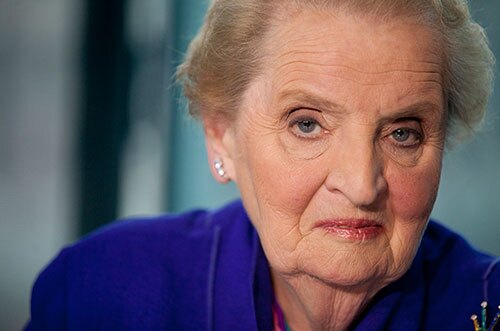
(Think we missed any? Feel free to add suggestions in the comments section below.)
Related:

<a href="http://www.amazon.com/Renegades-Write-Rules-Digital-Innovate/dp/1118340515" target="_blank">Renegades Write the Rules: How the Digital Royalty Use Social Media to Innovate</a>
"I only wish that I had discovered Martin's enthusiastic guide to seeking engagement utilizing nontraditional methods earlier. She showcases how businesses, and those leading them, can invigorate their social appeal while creating a sense of adventure along the way. (Recommended only for readers that want to change the world.)"
Jill Castilla, president and CEO of Citizens Bank of Edmond

<a href="http://www.amazon.com/Nudge-Improving-Decisions-Health-Happiness/dp/014311526X" target="_blank">Nudge: Improving Decisions about Health, Wealth, and Happiness</a>
"Thaler and Sunstein's book is a terrific read for financial marketers. Contrary to conventional economic thought, consumers aren't rational buyers. 'Nudge' provides fascinating insight into how decisions are made and influenced. In one example, simply making 401(k) plans an opt-out instead of an opt-in feature increased enrollment rates from 65% to 98% overnight. The authors demonstrate that the way a question is posed or an instruction given can nudge consumers towards a specific outcome. Soon after writing the book, Sunstein joined the Obama administration to bring behavioral economics to the writing of healthcare, climate change, food and other policies."
Kevin Tynan, senior vice president of marketing at Liberty Bank for Savings in Chicago

<a href="http://www.amazon.com/Hand-Mouth-Living-Bootstrap-America/dp/1611763304" target="_blank">Hand to Mouth: Living in Bootstrap America</a>
"There's no better way for bankers to understand the financial realities of the typical customer than to read this book. Tirado manages to bring humanity and laugh-out-loud humor to the depressing state of the economy for the other half."
Jennifer Tescher, president and CEO of the Center for Financial Services Innovation

<a href="http://www.amazon.com/Gods-Bankers-History-Money-Vatican/dp/1416576576" target="_blank">God's Bankers: A History of Money and Power at the Vatican</a>
"This book tells the fascinating real story of the Vatican Bank-surprisingly, started by a Nazi-and how the Vatican Bank was used for corruption and money laundering by Italians and Catholics. As an anti-money laundering and counter-terrorist financing lawyer, it was completely exciting for me to read about how the proceeds of crime were funneled through one of the most prominent and secretive banks of all time. One remaining issue: did the Vatican Bank profit from the Holocaust?"
Christine Duhaime, anti-money laundering and counter-terrorist financing lawyer

<a href="http://www.amazon.com/Zero-One-Notes-Startups-Future/dp/0804139296" target="_blank">Zero to One: Notes on Startups, or How to Build the Future</a>
"This inspiringly optimistic book by the tech entrepreneur who cofounded PayPal challenges readers to shake the proverbial Etch A Sketch and think boldly."
Marc Hochstein, editor in chief, American Banker

<a href="http://www.amazon.com/Digital-Gold-Bitcoin-Millionaires-Reinvent/dp/0062362496" target="_blank">Digital Gold: Bitcoin and the Inside Story of the Misfits and Millionaires Trying to Reinvent Money</a>
"This book is a gripping read. Popper tells Bitcoin's tale in a captivating narrative that invites both the uninitiated and die-hard enthusiasts. The reader is effortlessly engrossed and leaves newly expert in one of today's most revolutionary technologies."
Sarah Martin, vice president of the Digital Currency Council

<a href="http://www.amazon.com/When-Rob-Bank-Suggestions-Well-Intended-ebook/dp/B00FJ331Q8" target="_blank">When to Rob a Bank and 131 More Warped Suggestions and Well-Intended Rants</a>
"If the title doesn't immediately grab the attention of bankers, then the author's identities might. Levitt, an economics professor at the University of Chicago, and Dubner, a former New York Times Magazine writer, have made waves ever since they first teamed up on 'Freakonomics' 10 years ago. Though aspects of their initial book remain controversial, they've undeniably brought economics to pop consciousness in a way that few others have. Both authors have acknowledged the difficulty in maintaining the quality of material from their first effort, which relied heavily on years of Levitt's studies. That challenge may be why the latest installment looks to be a bit less structured, but it could make for decent reading in between ocean dips."
Colin Wilheim, reporter, American Banker

<a href="http://www.amazon.com/Misbehaving-The-Making-Behavioral-Economics/dp/1501238671" target="_blank">Misbehaving: The Making of Behavioral Economics</a>
"This book provides an excellent introduction to behavioral economics. There are many interesting lessons for bankers in the mixture of psychology and economics-especially in risk management. The financial crisis demonstrates that risk is managed by people, not mathematical models. Understanding the human decision-making process is critical to improving risk management and banking."
J.V. Rizzi, banking industry consultant and investor

<a href="http://www.amazon.com/Funny-Money-Mark-Singer/dp/0618197273" target="_blank">Funny Money</a>
"The recent collapse in oil prices wreaked havoc on banks with exposure to the energy industry. Oil has always been boom-or-bust, and this book tells the tale of the spectacular collapse of an Oklahoma community bank in the 1980s, thanks to its loose lending standards to wildcatters."
Andy Peters, news desk editor, American Banker
From Our Archive:

<a href="http://www.amazon.com/The-Forgotten-Depression-Crash-Itself/dp/1451686455" target="_blank">The Forgotten Depression: 1921: The Crash That Cured Itself</a>
"Grant reminds readers that the economic downturn of 1920-21 was as deep, and in some respects deeper, than the Great Depression. Yet in marked contrast with the Great Depression and Great Recession, recovery was rapid and robust. The Wilson and Harding administrations, for different reasons, did next to nothing. Washington let markets respond, in stark contrast to the full-throated interventions in the Great Depression and in the Great Recession that were designed to show government was helping. It's a fast read and an eye-opener."
Eric Grover, principal, Intrepid Ventures

<a href="http://www.amazon.com/Monetized-Alissa-Quart/dp/1881163563" target="_blank">Monetized</a>
"Money is often on journalist Alissa Quart's mind. Her 2003 book 'Branded: The Buying and Selling of Teenagers' explored how companies market their products to American youth, and she is co-editor of the Economic Hardship Reporting Project, which develops and funds reporting on poverty and inequality in the U.S. In her new book of poems 'Monetized,' Quart gets personal about the role that economics, gentrification and commercialization has played in her own life."
Sarah Todd, deputy editor for BankThink, American Banker

<a href="http://www.amazon.com/Who-Gets-What-Why-Matchmaking-ebook/dp/B00LZ7GQJQ" target="_blank">Who Gets Whatand Why</a>
"A little off the beaten path, this book explores how markets are created and used by people to make matches in everything from marriage to organ donation to medical student residencies."
J.V. Rizzi, banking industry consultant and investor

<a href="http://www.amazon.com/Debt-The-First-000-Years/dp/1612191290" target="_blank">Debt: The First 5,000 Years</a>
"In Debt, the anthropology professor and Occupy Wall Street activist David Graeber offers a history of debt from pre-modern indigenous societies up through modern finance. He argues that debt has its origins in slavery, plunder, and militarism, and says America needs a 'jubilee' under which all debts are forgiven [Lots of luck with that. Ed.]."
Chris Cumming, reporter, American Banker

<a href="http://www.amazon.com/The-Bonfire-Vanities-Tom-Wolfe/dp/0312427573" target="_blank">Bonfire of the Vanities</a>
"Sadly, recent events have renewed a national conversation on racism, police and economic opportunity. While hardly a new release, Wolfe's classic novel about the intersection of finance, politics, poverty, and virtually everything else in New York City seems as timely now as it was in the late 1980s. Wolfe handles these subjects with artful prose and skill, portraying the tragedy that sets the novel in motion without proselytizing. It's a classic in any era. Just don't, apparently, see the movie [You can certainly say that again. Ed.]."
Colin Wilheim, reporter, American Banker

<a href="http://www.amazon.com/The-Shah-Abbas-Milani/dp/0230340385" target="_blank">The Shah</a>
"In anticipation of a new Iran post-sanctions, understanding everything about Iran and Persian culture is a must for finance and regulatory professionals. This book is a great biography of the Shah of Iran that includes good research on the monarchy's source of funds and whether Iranian assets were removed from the country by the Shah's father, and then the Shah himself, when they were each removed from office. Overall, it's a good read to put Iran and Persian business and political culture in perspective for when Iran opens up for business with the West."
Christine Duhaime, anti-money laundering and counter-terrorist financing lawyer

<a href="http://www.amazon.com/Prague-Winter-Personal-Remembrance-1937-1948/dp/0062030345" target="_blank">Prague Winter: A Personal Story of Remembrance and War, 1937-1948</a>
"Although former Secretary of State Madeleine Albright was very young for most of World War II, she has enough family history at hand to construct a historical narrative that at times feels like a novel. It's not only the story of politics, war and escape; it's also the tale of how an intelligent and resourceful family raised one of the most respected and successful women in the world. This book will likely be of interest to readers invested in women's ongoing efforts to gain powerful positions in the financial industry and beyond. If you're a Kindle reader, the Kindle version has video, photos, and audio to further bring the story to life."
Tana Tymesen, opinion editor, National Mortgage News

<a href="http://gimletmedia.com/show/startup/" target="_blank">StartUp</a>
"Saying you want to 'disrupt' an industry is easy. Building a company from the ground up is hard-as in, drain-your-savings and test-your-love-life hard. This podcast provides a peek into professional and personal lives of tech entrepreneurs and shows how companies struggle with some of the oldest issues in business: How do you build a company culture? When is it a good idea to change your business plan? It's a great listen for summer road trips. Also recommended for daily commutes, or running errands around the city."
Kristin Broughton, reporter, American Banker

<a href="http://www.amazon.com/Every-Cradle-Grave-Rethinking-Suicide/dp/0989697290/" target="_blank">Every Cradle Is a Grave: Rethinking the Ethics of Birth and Suicide</a>
"Just started reading this and man, is it unsettling. But it makes you think, and question long-held assumptions. Maybe it's not for the beach, but suitable for the overcast and rainy days, especially during thunderstorms."
Marc Hochstein, Editor in Chief, American Banker





